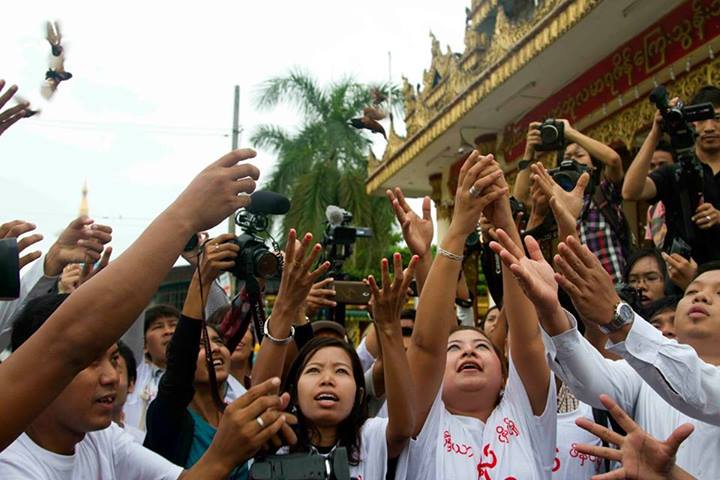International condemnation of the Burmese government was swift and scathing in the wake of a Magwe court’s decision on Thursday to sentence four reporters and the CEO of Unity Weekly journal to ten years in prison with hard labour after being convicted of revealing state secrets.
The media workers were arrested for publishing an investigative report in January alleging that a military facility in the central Burmese town of Pauk was used for the production of chemical weapons.
Amnesty International said it was a “dark day for freedom of expression” in Burma, while Reporters Sans Frontières referred to the sentencing as a “grave setback for press freedom” in the country.
And in Sala Baganza, a small town in central Italy that recently bestowed honorary citizenship on the Unity staffers, Mayor Cristina Merusi said her townsfolk were “stunned and incredulous” by news of the sentence.
In Burma, where observers have in recent months observed a noticeable backsliding on media freedom by the Thein Sein government, reaction was more muted with several civic society groups expressing little surprise at the decision to convict but alarm at the severity of the sentence.
Speaking to DVB on Thursday, Rupert Abbot, the deputy director of Amnesty International’s Asia-Pacific programme, said, “This is a very dark day for freedom of expression in Myanmar [Burma]. Today’s sentences expose a hollowness to the government’s promises to improve the human rights situation in the country. They reflect a wider crackdown on free media since the turn of the year, despite government assurances that such practices would end.”
His sentiments were echoed by international press watchdog, the Committee to Protect Journalists (CPJ).
“CPJ is alarmed that journalists were tried under a 100-year-old spying statute and slammed with an outrageously harsh sentence,” said Asia program coordinator Bob Dietz. “This conviction should shatter any illusions that President Thein Sein’s government grasps the role of a free press in a democracy. The international community should act quickly to not only get this decision reversed, but to impress upon the government that its anti-media stance will jeopardize future economic assistance.”
Fellow media watchdog Reporters Sans Frontières was equally critical.
“This decision by the Magway [Magwe] court is a grave setback for press freedom,” said Benjamin Ismaïl, the head of the organisation’s Asia-Pacific desk. “Progress had been made, but this case marks a return to a dark time when journalists and bloggers who did their job were jailed on national security charges or for allegedly trying to overthrow the government.”
On Friday, Gayathry Venkiteswaran, the executive director of the Southeast Asia Press Alliance, said, “We find that the use of the law in the guise of national security is a major threat to the journalist community, so it is really uncalled for – the level of harsh sentencing that was given yesterday. We are very disturbed by this.”
At home, Zaw Thet Htwe of the Interim Press Council said that the verdict could be taken as an indication that all media are at risk of prosecution in Burma “at any time”.
“The government will not tolerate us touching upon issues about the nation, about government policy or politics,” he said.
Ko Jimmy of the 88 Generation Peace and Open Society called the 10-year sentence an “extremely harsh punishment”, while Ko Ni, a Rangoon High Court lawyer, called the verdict “a bit too harsh”.
[related]
“In my opinion, even if the Unity staff were guilty of the charges, the court should have considered a lighter punishment since this was their first offense, and it was only recently that we found out that the facility in question was actually designated as a prohibited area under the Official Secrets Acts,” said the lawyer.
Lower House MP Ye Htun was a lone voice in siding with the court verdict.
“While I acknowledge Unity journal’s responsibility to inform the public, they should also have considered what the law says – that the press must not report on issues prohibited by law on grounds of national security or to avoid civilian unrest,” he said. “They must abide by a code of ethics.”
While on trial, the five accused media workers were presented in absentia with honorary citizenship in the central Italian town of Sala Baganza, near Parma.
News that the five – reporters Lu Maw Naing, Sithu Soe, Aung Thura and Yazar Oo, and CEO Tint Hsan – had been sentenced to a decade with hard labour “leaves the people of Sala Baganza stunned and incredulous,” said the town’s mayor, Cristina Merusi.
“We believe in law and democracy, and are compelled to request an explanation from the Myanmar authorities on a ruling that goes beyond all horizons,” she said in an open letter. “We express the solidarity of the entire community to our fellow residents, and request that this verdict be revised immediately by the court.”
An additional statement by Giuseppe Malpeli, president of the Burma-Italy Friendship Association, condemned the Magwe court’s decision as a “boulder on the path of democratic transition in Myanmar”. The group further called on the Italian president to cancel an upcoming EU-ASEAN meeting scheduled to take place in Milan in view of the severity of the verdict.
A day before the final hearing of the Unity Weekly trial on 30 June, operations at the news journal ceased due to financial problems.
“We told our staff members that we are going out of operation for financial reasons,” said a company administrator. “The trial has been wearing us thin so we had to make this decision.”
Meanwhile, as media focus has landed on the fate of the Unity Five, the original report that the Burmese military was operating a secret weapons facility, consisting of underground tunnels on more than 3,000 acres of land in Magwe Division, has largely been forgotten.
Unity Weekly reported that the Burmese government rejected the allegations; however, local villagers cited in the report said Chinese technicians were frequently seen at the facility and that its workers told reporters they were producing chemical weapons.



